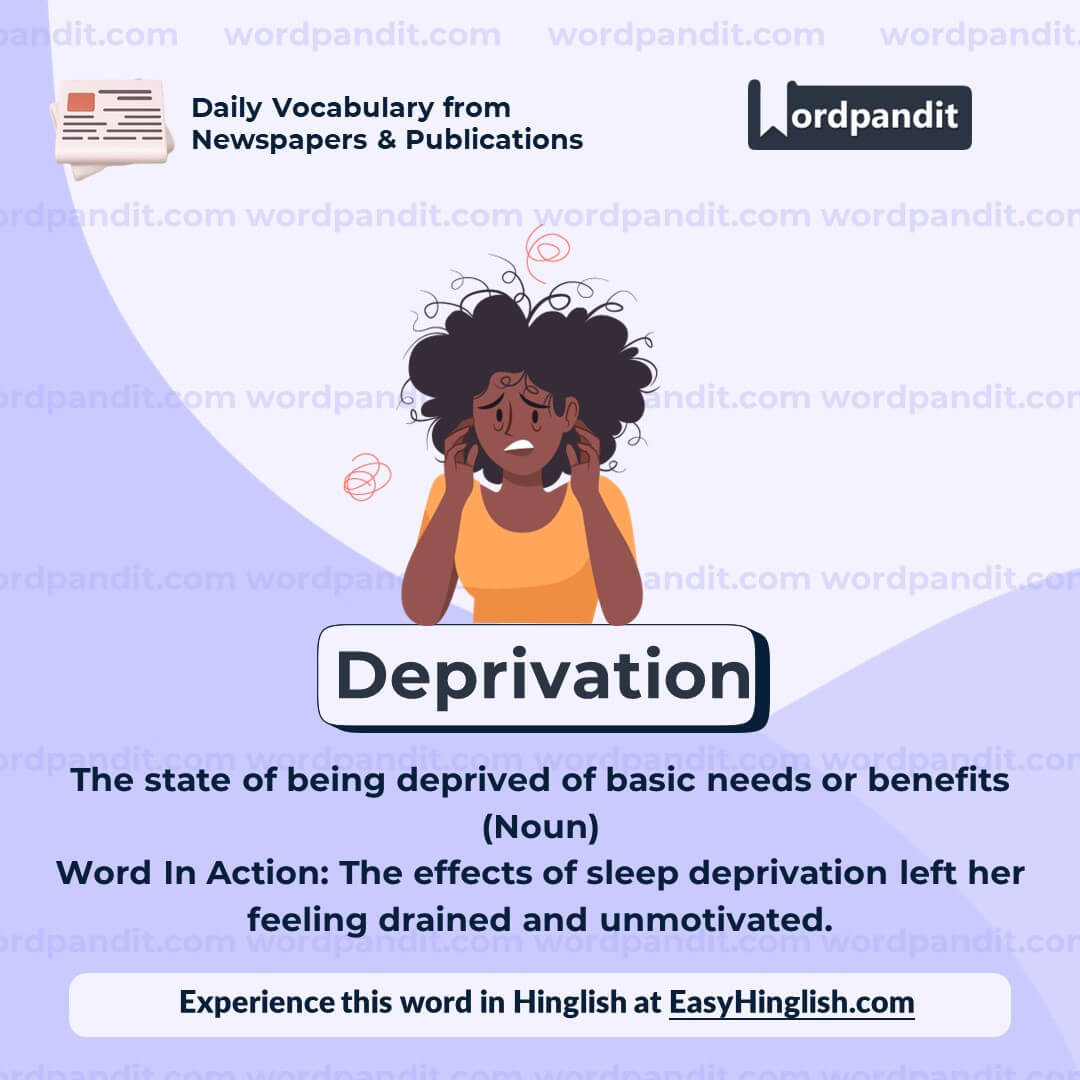Daily Vocabulary from Indian Newspapers and Publications
Welcome to Wordpandit’s Indian Vocabulary Hub
At Wordpandit, we understand the importance of staying rooted in the local context while expanding your language skills. This section focuses on enriching your vocabulary with words and phrases drawn from India’s leading newspapers and publications, ensuring you're learning vocabulary that is practical, relevant, and uniquely Indian.
Why Indian Sources Matter
We believe that the best way to master any language is by immersing yourself in local content. That’s why we carefully curate vocabulary from top Indian publications, including:
- The Hindu
- The Times of India
- The Economic Times
- Hindustan Times
- Live Mint
- The Indian Express
- And many others...
Stay Updated, Stay Relevant
With daily updates from Indian news sources, you’ll be consistently learning words that reflect the trends and shifts in Indian society and culture. Our focus is to provide vocabulary that enhances your understanding of the language in an Indian context.
How Wordpandit Supports Your Goals
Whether you’re preparing for exams, aiming to improve your professional communication, or simply want to stay connected with the latest Indian vocabulary, Wordpandit is here to guide you every step of the way.
Learn with a Practical Approach
Our interactive learning methodology includes real-world examples, engaging activities, and context-specific usage to ensure that every word becomes part of your active vocabulary.
Dive into Indian Vocabulary Today!
Why Choose Wordpandit?
Practical Learning: Focus on words you'll actually encounter in real-world reading, enhancing your comprehension and communication skills.
Diverse Content: From current affairs to scientific breakthroughs, our varied sources expose you to vocabulary across multiple domains.
Effortless Integration: Make Wordpandit a part of your daily routine. Just a few minutes each day can significantly boost your lexicon over time.
Your Path to Vocabulary Mastery
- Visit our Daily Vocabulary section regularly
- Explore new words and their usage in context
- Practice incorporating these words into your own writing and speech
- Track your progress as your vocabulary expands
Start Your Journey Today
Embark on your vocabulary enhancement journey with Wordpandit. By consistently engaging with our daily posts, you'll build a robust vocabulary that serves you well in academic, professional, and personal contexts.
Remember, a word a day keeps linguistic limitations at bay. Make Wordpandit your daily companion in the quest for vocabulary excellence!
WORD-1: Deferential
Context:
"Although many imagine that to be a more deferential era, some of the squibs were more vulgar and cruel than anything that would appear in the mainstream media today." - The Wire
Explanatory Paragraph:
The word "deferential" refers to showing respect, humility, or submission, often toward someone in authority or with greater knowledge. It conveys an attitude of esteem and acknowledgment of another's position or opinion.
Meaning: Showing respect and esteem, often to a superior or elder (Adjective)
Pronunciation: dih-FER-en-shul
Difficulty Level: ⭐⭐⭐ Intermediate
Etymology: Derived from the Latin word "dēferre," meaning "to bring down" or "to yield."
Synonyms & Antonyms:
Synonyms: Respectful, courteous, humble, submissive
Antonyms: Disrespectful, impudent, defiant, arrogant
Usage Examples:
- The intern was deferential to the senior team members, always valuing their advice and guidance.
- In traditional societies, children are often taught to be deferential to their elders.
- He adopted a deferential tone while addressing the judge in the courtroom.
- The professor appreciated the student's deferential approach to asking questions during the lecture.
Cultural Reference:
"The concept of deference is central to Confucian philosophy, where showing respect to one's elders and authority figures is seen as a virtue." - Philosophy Archives
Think About It:
How can being deferential positively or negatively impact communication in a professional environment?
Quick Activity:
Write a short dialogue between a mentor and mentee where the mentee demonstrates a deferential attitude.
Memory Tip:
Think of "deferential" as "deferring" to someone else out of respect—just like a polite bow or nod to acknowledge their authority.
Real-World Application:
In customer service roles, a deferential attitude can help diffuse tense situations and foster positive relationships with clients.
WORD-2: Deprivation
Context:
"Argue that this more accurately reflects ‘the challenges of deprivation’ than the conventional measure of poverty. While they conclude that both measures have ‘pros and cons’ and they are not stating a preference." - The Wire
Explanatory Paragraph:
The word "deprivation" refers to the state of lacking something essential, such as food, water, shelter, or other basic necessities. It often implies a sense of hardship and suffering due to insufficient resources or opportunities.
Meaning: The state of being deprived of basic needs or benefits (Noun)
Pronunciation: dep-ruh-VAY-shun
Difficulty Level: ⭐⭐⭐ Intermediate
Etymology: Derived from the Latin word "deprivare," meaning "to strip away" or "to take from."
Prashant Sir's Notes:
Deprivation is not just about material poverty; it also encompasses emotional and social aspects, such as a lack of access to education or meaningful relationships.
Synonyms & Antonyms:
Synonyms: Poverty, hardship, deficiency, lack
Antonyms: Abundance, affluence, plenty, wealth
Usage Examples:
- Years of deprivation during the war left the community struggling to rebuild.
- Childhood deprivation can have long-term effects on physical and mental health.
- Sleep deprivation negatively impacts both cognitive performance and emotional stability.
- The government implemented programs to address the deprivation faced by marginalized groups.
Cultural Reference:
"The concept of deprivation is central to the UN's Human Development Index, which measures not only income but also access to education and healthcare." - United Nations Development Program
Think About It:
How can societies ensure that addressing deprivation does not create dependency but empowers individuals instead?
Quick Activity:
List three types of deprivation (e.g., material, emotional, social) and provide an example of each from your own observations or readings.
Memory Tip:
Remember "deprivation" by linking it to "deprived," as in something essential being taken away, leaving a void or lack.
Real-World Application:
Understanding deprivation is key for policymakers when designing programs to combat poverty, improve education, and provide equitable access to healthcare.
WORD-3: Indigenous
Context:
"The steps that should be followed are to study the PLA in detail; decide on technologies to be built indigenously and those to be procured from friendly nations." - The Wire
Explanatory Paragraph:
The word "indigenous" refers to something that originates or occurs naturally in a specific place or environment. It is often used to describe native peoples, cultures, flora, or fauna that are inherently tied to a particular region. In a broader context, it can also apply to resources, practices, or technologies developed within a specific country or community.
Meaning: Originating or occurring naturally in a particular place; native (Adjective)
Pronunciation: in-DIJ-uh-nus
Difficulty Level: ⭐⭐⭐ Intermediate
Etymology: Derived from the Latin word "indigenus," meaning "born in a place," from "indu" (in) and "gignere" (to beget).
Synonyms & Antonyms:
Synonyms: Native, local, endemic, aboriginal
Antonyms: Foreign, imported, alien, external
Usage Examples:
- The indigenous people of the region have preserved their cultural traditions for centuries.
- The government emphasized the need to promote indigenous manufacturing industries.
- Indigenous species often play a crucial role in maintaining the local ecosystem.
- Efforts to indigenously develop renewable energy technologies have gained momentum.
Cultural Reference:
"The United Nations declared August 9th as the International Day of the World’s Indigenous Peoples to celebrate and protect their cultures, rights, and contributions to global diversity." - United Nations
Think About It:
Why is it important to preserve indigenous knowledge and practices in a rapidly globalizing world?
Quick Activity:
Identify three indigenous innovations or practices from your country and explain their significance.
Memory Tip:
Think of "indigenous" as "in-dig" — something deeply rooted in a particular region or place.
Real-World Application:
Promoting indigenous industries helps boost the economy, reduce reliance on imports, and preserve cultural heritage. It is particularly vital in areas like traditional medicine, sustainable agriculture, and renewable energy.
WORD-4: Aggrieved
Context:
"In promoting a ‘religious nationalism’ propped by BJP alliances with ‘upper caste Hindus, aggrieved middle class, the business community,’ ‘governance is not the point’ for the ‘partisan, ideological formation that is the Hindutva project.’" - The Wire
Explanatory Paragraph:
The word "aggrieved" describes a state of being upset or resentful, typically due to feeling mistreated, wronged, or deprived of something. It often connotes a sense of grievance or injustice experienced by an individual or group.
Meaning: Feeling angry, resentful, or distressed because of unfair treatment (Adjective)
Pronunciation: uh-GREEVD
Difficulty Level: ⭐⭐⭐ Intermediate
Etymology: Derived from the Old French word "agrever," meaning "to make heavier" or "to oppress," which stems from the Latin "gravare," meaning "to burden."
Synonyms & Antonyms:
Synonyms: Resentful, discontented, hurt, distressed
Antonyms: Content, satisfied, happy, appeased
Usage Examples:
- The aggrieved employees protested against the sudden layoffs without compensation.
- She felt aggrieved when her contributions to the project were overlooked.
- Many aggrieved citizens voiced their concerns about the new tax policy.
- His aggrieved tone suggested that he expected more support from his friends.
Cultural Reference:
"The idea of an aggrieved community is central to many social justice movements, where groups rally against perceived systemic injustices." - Social Justice Archives
Think About It:
How can societies address the grievances of aggrieved groups without compromising fairness and equality for others?
Quick Activity:
Think of a time when you felt aggrieved. Write a short paragraph explaining the situation and how it was resolved, if at all.
Memory Tip:
Associate "aggrieved" with "grievance" — a formal complaint due to feeling wronged.
Real-World Application:
Understanding the feelings of aggrieved individuals or groups is crucial in fields like conflict resolution, public policy, and social work to address grievances and foster harmony.
WORD-5: Complacency
Context:
"Over time, however, the nation slips back into complacency, awaiting another incident to reignite its fury. From Mathura, to Nirbhaya to R.G. Kar, the cycle of tragedy remains unbroken." - The Wire
Explanatory Paragraph:
The word "complacency" refers to a self-satisfied state of being, often accompanied by a lack of awareness of potential risks or dangers. It describes a sense of contentment that can lead to neglecting necessary action or vigilance.
Meaning: A feeling of smug or uncritical satisfaction with oneself or one's achievements, often leading to inaction (Noun)
Pronunciation: kuhm-PLAY-suhn-see
Difficulty Level: ⭐⭐⭐ Intermediate
Etymology: Derived from the Latin word "complacere," meaning "to please entirely," which combines "com" (altogether) and "placere" (to please).
Synonyms & Antonyms:
Synonyms: Smugness, self-satisfaction, apathy, indifference
Antonyms: Vigilance, awareness, concern, diligence
Usage Examples:
- The team's early success led to complacency, and they lost their drive to improve further.
- Public complacency about health precautions contributed to the resurgence of the virus.
- The CEO warned against complacency, urging employees to remain innovative and competitive.
- Complacency in the face of environmental issues can have long-term detrimental effects.
Cultural Reference:
"The phrase 'eternal vigilance is the price of liberty,' attributed to Thomas Jefferson, highlights the dangers of complacency in safeguarding freedom and democracy." - Historical Archives
Think About It:
What are the potential consequences of societal complacency in addressing issues like climate change or inequality?
Quick Activity:
Identify a situation in your life or community where complacency might be a risk. Write down three steps to counteract it.
Memory Tip:
Link "complacency" with "place"—as if you’re staying in one place and not moving forward because you're too satisfied.
Real-World Application:
Recognizing and addressing complacency is essential in fields like safety management, governance, and personal development to ensure continuous improvement and vigilance.


















